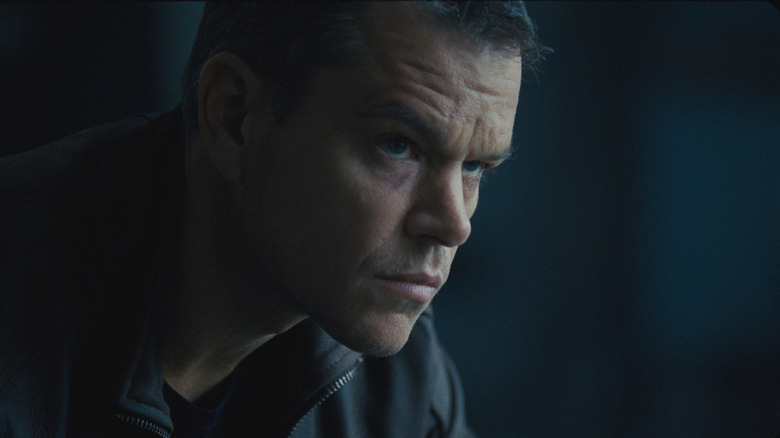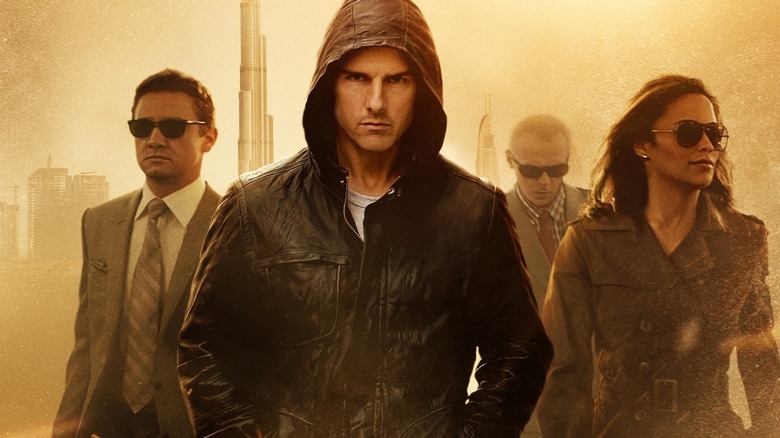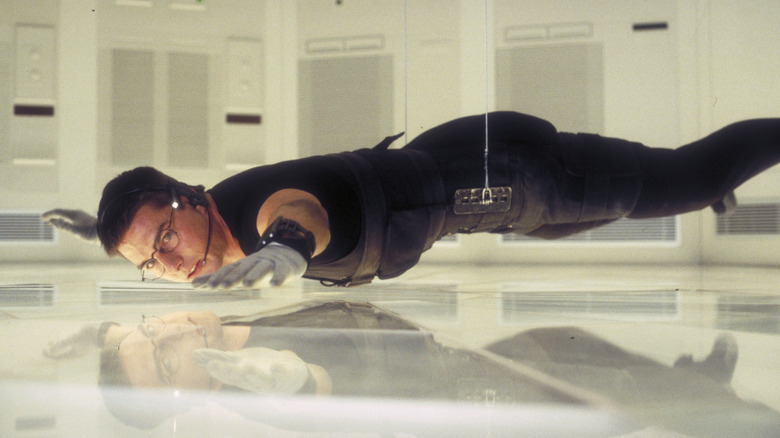How Realistic Are Your Favorite Spy Movies? Our Expert Weighs In
By now, we're all familiar with how the rules of engagement for spies work — on the big screen, at least. But what if all our assumptions about fictional espionage don't fully line up with the murkiness of reality? We all cheered when a rookie James Bond killed a couple of bad guys (rather brutally, might I add) and received his license to kill, no holds barred. Or when Ethan Hunt goes rogue and is disavowed by his government again and again, only to save the day and be welcomed back with arms open wide. Even in examples based on real-world history, like the upcoming "The Ministry of Ungentlemanly Warfare," filmmakers tend to up the ante considerably and make certain leaps of logic in the pursuit of weaving an entertaining yarn.
But, then again, perhaps fact and fiction aren't always on opposing sides of this battlefield, after all. Nobody's claiming that surfing a tsunami is truly the best or most effective weapon at a superspy's disposal, granted, but even Hollywood's biggest franchises and most popular secret agents sometimes get close to the mark ... however improbable that might seem to us laypeople. That's precisely why we sought out a knowledgeable source from the inside who could answer all our most burning questions about just how realistic our favorite spy movies really are (and aren't).
Enter Robert "Bobby" Chacon, a retired FBI special agent, technical advisor on movies and television shows, and now a screenwriter and actor in his own right. Naturally, we seized the opportunity to talk to an expert and dig deep on a wide range of topics — from kill counts to NOC lists, from prolific writers like Tom Clancy to the exploits of Tom Cruise in the "Mission: Impossible" movies, and everything in between.
A license to kill ... of sorts
Breaking news: Assets who are specially trained in methods of killing usually end up using those skills to eliminate targets. Shocking, I know. But while famous characters like James Bond or Jason Bourne have completely skewed the public perception about what that actually entails, it turns out that the fundamental idea of a so-called license to kill actually does have a basis in reality. ("Bond" writer Ian Fleming, who served in British naval intelligence during World War II and appears as a character early on in "The Ministry of Ungentlemanly Warfare," may have borrowed this from his own wartime experiences.)
When posed this question by /Film, Bobby Chacon pointed to a few examples of real-world counterparts in modern warfare. Though he notes that, "There is no 'license to kill' per se," established doctrines such as Rules of Engagement (ROEs) and Use of Deadly Force cover similar ground in the world of counterintelligence. The classic Bondian concept has always provided a way for the character to literally shoot his way out of any situation without fear of repercussions. Things are slightly more complicated out in the field, according to Chacon:
"CIA agents and case officers [are] subject to all the law and regulations that everyone else is but, since the counterintelligence and counterterrorism missions have overlapped so much since the 9/11 attacks, there have been separate, and sometimes secret, rules put into place that would allow a 'license to kill'-type interpretation to be valid."
No kidding. Chacon points us to the precedent set during the so-called "War on Terror," when then-President George W. Bush enacted a policy that gave the CIA their own license to kill targets abroad ... even American citizens. Suddenly, the "Bourne" movies don't seem so far-fetched.
A burning sensation
"How many times has Hunt's government betrayed him?" Henry Cavill's August Walker rhetorically asks at one point in "Mission: Impossible — Fallout." "Disavowed him? Cast him aside? How long until a man like that has had enough?" The antagonist certainly raised a good point, considering just how often this stands out as a key plot point throughout the "Mission: Impossible" movies. One would think that constantly having one's own employers turn their back on an almost routine basis would take a toll on a guy, but Ethan Hunt just keeps trucking along.
Those who've watched the USA series "Burn Notice" already know that the idea of government disavowals isn't completely made up for our entertainment — burn notices are a very real consequence. Although, as Chacon points out, it's tough to pin down whether governments issuing such notices can compete with the sheer frequency of drama in your standard "Mission: Impossible" movie. In fact, it's typically a good thing for operatives when they receive burn notices. According to our expert:
"Yes, a burn notice is an actual document/policy, but it is unknown how often they are actually used. And unlike [how] they are universally portrayed in TV and movies, they are most often used to actually benefit the agent/operative."
To back this up, he specifically namedrops Valerie Plame, an ex-CIA operative whose identity was publicly leaked in 2003 in an incident known as "The Plame Affair." He goes on to explain that, "Due to their very nature, burn notices are often short and devoid of any significant information about the agent subject to the notice." This similarly checks out, as this image of an authentic document from the 1950s shows. It's not quite as dramatic as the President initiating Ghost Protocol, admittedly, but we'll take it.
A tool for every occasion
What do you do when you're in a jam and your back is against the wall? 007 rings up Q for the latest, cutting-edge example of gadget wizardry provided by the Crown. Ethan Hunt has his loyal friend Benji (Simon Pegg) and the entire resources of the Impossible Mission Force at his disposal. Time and again, our favorite cinematic heroes get themselves into the toughest of situations and only have their wit, expertise, and the perfectly timed deployment of some fancy tech to find a way out.
Modern espionage, Chacon reveals, isn't that far removed from your typical "Bond" movie:
"The real-life 'Qs' of James Bond fame exist within the CIA's Office of Technical Service (OTS) and the FBI's Engineering Research Facility (ERF). These units consist of engineers, mechanics, former field agents, and others who bring unique and varied skill sets to serve the field agents."
It's become a trope of the genre to include nifty gadgets like watches that fire bullets, cigarette lighters that act as explosive detonators, and souped-up cars. Despite our prodding, however, Chacon isn't about to spill state secrets:
"I could not and would not divulge the most incredible cutting-edge gadgets currently in use, but they would no doubt surprise the general public."
He does mention that, oftentimes, "[...] a foreign intelligence service or a drug cartel comes up with a way or a gadget to go undetected, so the OTS and/or ERF work to come up with a device to defeat that technology and once they do, the foreign intelligence service or cartel goes to work to defeat whatever OTS and ERF came up with, and the cycle repeats itself." Though not a spy movie, the "escalation" scene from the end of "Batman Begins" lays out this game of one-upmanship with startling accuracy.
(Secret) identity crisis
At some point in their career, a fictional operative is bound to come up against an enemy dead set on leaking classified information containing the names and aliases of other secret agents. The 1996 "Mission: Impossible" movie built its most enduring image around the set piece in which Ethan Hunt breaks into the CIA to recover the fabled NOC list. In 2012's "Skyfall," Bond's near-fatal opening mission kicks off because MI6's roster of agents and their true identities is at risk of falling into the wrong hands. It's inevitable.
So what about in real life? Surely world superpowers and their intelligence agencies wouldn't put such sensitive material on actual databases ... right? Well, believe it or not, this is more or less how various entities do it. The only difference, of course, is that it's virtually impossible for enemy spies to pull off such dramatic heists. As Chacon put it, "All information must be housed somewhere, even the NOC lists. But they are the most secure and encrypted files an agency maintains and it's hard to imagine a scenario, absent Tom Cruise dangling 25 feet into a climate-controlled room and catching a droplet of his own sweat, where such lists could be surreptitiously obtained."
21st Century combat has seen an unprecedented increase in hacking attempts, cyber warfare, and even attempts at interfering with elections. (Somewhere, Vladimir Putin's ears might be burning.) We can probably rest assured that such criminal acts don't play out quite like in "Skyfall," when a fresh-faced Q (Ben Whishaw) plugs in a laptop into the MI6 mainframe and basically allows Javier Bardem's villainous Raoul Silva to take over the entire system. In actuality, real life is much more boring ... and, arguably, far more dangerous.
The Argylle effect
You know how it goes. You're minding your own business, writing up an original spy thriller as your next major manuscript, and suddenly you find yourself caught up in an international caper where the lines between reality and fiction blend together — all because your story is eerily similar to real-life espionage. Okay, so that doesn't really happen every day, but that was the premise of Matthew Vaughn's most recent directing effort in "Argylle."
Although obviously taking inspiration from the likes of "Romancing the Stone" and other classics, the film does have roots in actual history. Prolific novelist John le Carré (the author of works such as "The Spy Who Came in from the Cold" and "Tinker Tailor Soldier Spy") was a former spy during the 1950s and 1960s, and he consistently took inspiration from his own past to flesh out the details of his various espionage stories. With that in mind, we had to ask Chacon about any other examples of this happening. According to our ex-FBI agent source:
"It's rare that laypeople unknowingly get things close to reality, but what is more common is that a novelist like Tom Clancy does such incredible and meticulous research that they can factually portray certain activities accurately, because they knew where to look and they developed good sources in the intelligence world that provide them with that information."
That's a win for every dad with bookshelves full of Tom Clancy novels in their home office, folks! As for Hollywood and our love affair with fictional spies, however, the jury's still out. The next time you catch an episode of "Alias" or throw on "No Time To Die," consider this. Somewhere, someone out there might be pulling off their own version of Bond-like spycraft ... only a little more toned down.





